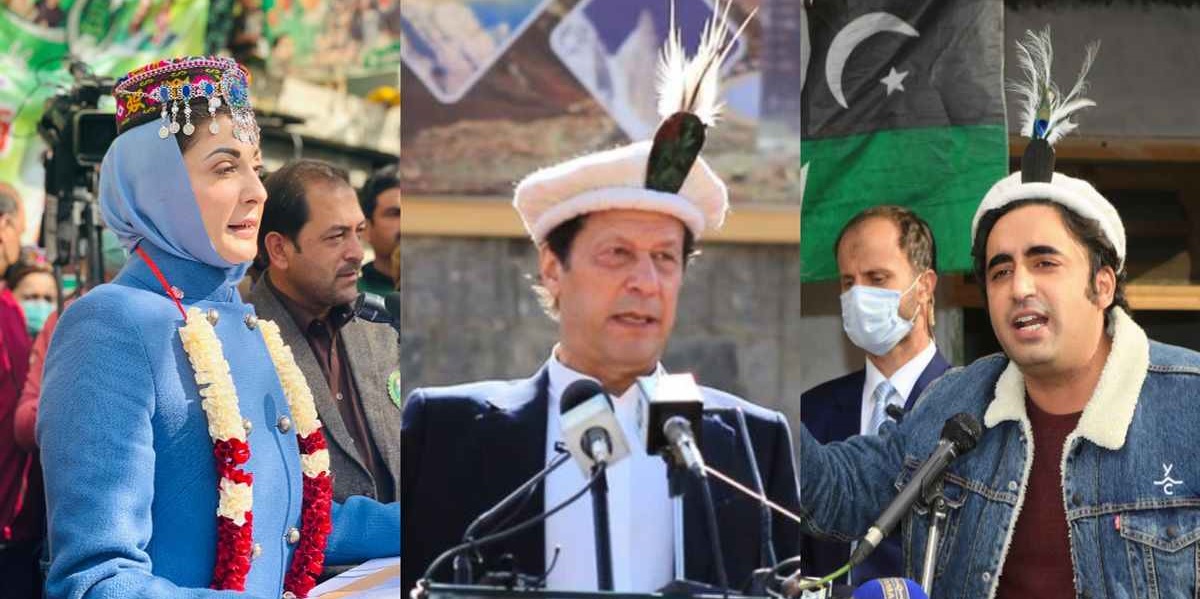Gilgit-Baltistan (GB), formally known as the Federally Administered Northern Areas (FANA), is an autonomous region northern Pakistan with separate government and electoral systems. Gilgit Baltistan is an autonomous region in Pakistan’s northern part, having its own government and electoral system.
Gilgit Baltistan, formerly a part of Kashmir, held its third legislative assembly elections in mid of November. As a result of these elections, the ruling party in Islamabad surfaced as the winner. These results were rejected and protested against by the losing candidates claiming elections to be unfair and not transparent. The reports of various organizations have more or less shunned these claims. Moreover, the results show emerging trends of the politics in Gilgit Baltistan. These trends do come up with some lessons to learn for the political parties of Pakistan.
The third legislative elections of Gilgit Baltistan were to occur in August, but due to Covid-19 situations, they were postponed. They were scheduled to be contested in mid of November. And on 15th November, the public of Gilgit Baltistan came out to vote, and subsequently, results were announced, and Pakistan Tehreek-E-Insaaf emerged as the winner of the battle of the 2022 election debacle.
Pakistan Tehreek-E-Insaaf (PTI) has got the most seats but fell short of the simple majority to form the government. It secured the remaining seats with the help of independent candidates. Compared with the last two elections in Gilgit Baltistan – which were won by Pakistan People’s Party (2009) and PML (N) (2015), Pakistan Tehreek-E-Insaaf could not get a decisive victory as they did in their respective successes.
After the results’ announcement, the losing parties protested against the results and called the elections rigged. There were alleged of violations of the codes of the election commission by the ruling party. These violations were keenly highlighted and protested by opposition parties. They have alleged that the elections were unfair and lacked transparency. The Free and Fair Elections have released its preliminary report, which has cleared the air that elections were fair, although there have been such discrepancies.
Pakistan People’s Party chairman Bilawal Bhutto had led a vigorous campaign in Gilgit Baltistan. They could not win the election as they might have expected, but they managed to attract more voters (26%) than in previous elections (18%). PLMN, on the other hand, failed miserably as it only got two seats. Interestingly, two former chief ministers of this region lost their constituencies, and two independent candidates who were denied the tickets of Pakistan Tehreek-E-Insaaf (PTI) won against candidates of Pakistan Tehreek-E-Insaaf.
The region, which was part of the formerly princely state of Jammu and Kashmir (J&K), is contested by Pakistan, India and the native inhabitants. In 1970, it became a single administrative unit called the Northern Areas under administrative control of the Ministry of Kashmir Affairs and Northern Areas, formed from the amalgamation of the Gilgit Agency, the Baltistan District of the Ladakh Wazarat, and the states of Hunza and Nagar. The region is divided into two administrative divisions: Gilgit and Baltistan/Skardu.
The government structure and electoral framework for the GB region is outlined in the “GilgitBaltistan Empowerment and Self-Governance Order 2009.” The Order introduced administrative, political, financial and judicial reforms and built upon the previous reforms of 1970, 1975 and 1994, establishing the system of government.
The first elections for the Legislative Assembly were held on 12 November 2009, and subsequent, legal amendments were introduced to improve the existing legal framework. The major amendments include the changing the manual electoral roll into computerized electoral roll database based on national identity card numbers that act as unique voter identification, and Introduction of a caretaker government after the Legislative Assembly is dissolved to oversee the conduct of elections and serve until the formation of the elected government.
The GB Council plays key role in policymaking and provides the essential link between the GB Government and the Government of Pakistan. It has the power to address 55 subjects for example, coordination with the Government of Pakistan on banking business and planning for economic coordination including scientific and technological research and make laws regarding these subjects.
The GB Council consists of the following members i-e the Prime Minister of Pakistan who serves as Chairman of the Council the Governor of GB, who serves as Vice Chairman the Chief Minister of GB six members who are elected by the Legislative Assembly under a system of proportional representation by means of a single transferable vote; and another six members who are nominated by the Prime minister of Pakistan from time to time from amongst Federal Ministers and members of Parliament.
There is much fuss about pre-poll rigging and political engineering after embracing defeat by losing parties. What these parties are missing out on is the performance when they were in governments. Also, what did they do to strengthen their party organization in the region during those years?
It is time to look deeper to find the causes of failure. A weak party structure is one of the reasons. Since the region does not take part in deciding the government of Pakistan, political parties tend to ignore this region and only turn their heads towards it in election times. Therefore, to win the region, they must organize party structures here, and political work at grass root level must also be done. Instead of focusing on electable who are usually elite people and have no political ideology they must focus on building their own candidates. These electable tend to side with the expected winners before elections. This practice must be stopped as it damages the democracy and credibility of political parties.
In short, it can be said that the results of the elections came out as expected and subsequent hue and cry over it was also foreseen. But the important thing is to learn from the mistakes and general trends of the politics in Gilgit Baltistan (GB). Political parties need to survive in Gilgit Baltistan (GB) to organize their party structures in the region and discourage the fashion of electable. Also, it is essential that the hopes and aspirations of the region must be fulfilled by rulers to remain relevant in the region.

The author is doing M. Phil in Public Policy and Governance. He is working as a freelancer. Previously worked with HubPages and Washington Post.
